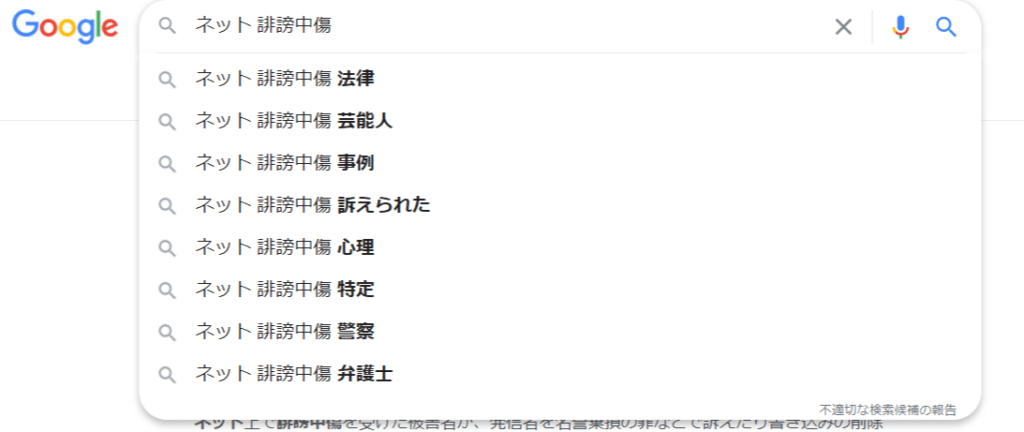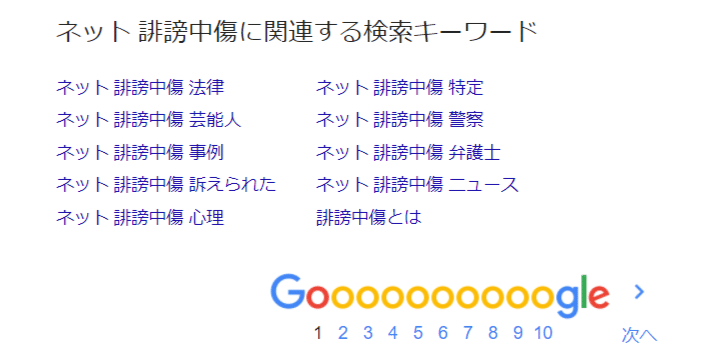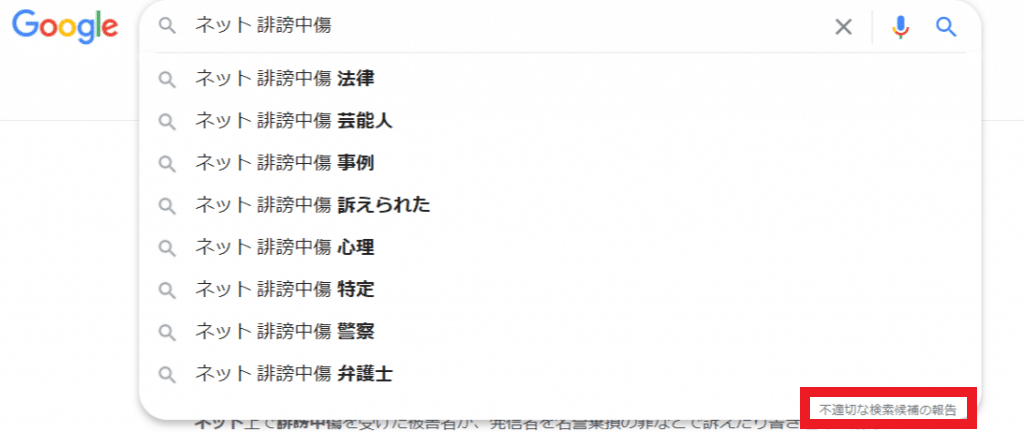A Comprehensive Guide on How to Delete Google Suggestions and Understand Their Display Mechanism

When you use search engines like Google or Yahoo! JAPAN to perform a keyword search, numerous related words containing the target word are displayed. This feature is called ‘Suggest’. The search engine is proposing, ‘Isn’t this what you want to find out?’
In Suggest, a list of related keywords is displayed in order of relevance. The words displayed are referred to as ‘Suggest Words’ or ‘Related Search Keywords’.
In this article, we will explain how to delete these ‘Related Search Keywords’. If you are troubled by the display of negative words, please refer to this.
Definition of Google Suggest and Related Search Keywords
What is Suggest?
Suggest is a feature that performs predictive conversion. When you search for keywords on the internet, words that are likely to be searched together are displayed in succession.

At Google, this Suggest feature is also referred to as the “Google Autocomplete function”.
Personalized Search and Incognito Mode
Google also has a feature called “Personalized Search”, which reflects search needs based on user data such as past search results and viewed sites in the search results. While this is a very convenient feature, it can also bring your company’s website to the top of the search rankings based on the history of repeated searches and views when you want to check the search ranking of your own website.
When you want to check the real search ranking of your own site or when you do not want to reflect personal information in the search results, you can search without leaving a history by clicking on the three black dots in the upper right corner of the screen and then clicking “New Incognito Window” (Incognito Mode). You can also display non-personalized search results with “Ctrl+Shift+N” or “command+Shift+N”.
What are Related Search Keywords?
Words that are likely to be searched together with keywords and words with high relevance are extracted and displayed in order of search frequency. While Suggest is displayed just below the search window, related search keywords are displayed at the bottom of the page.

Related search keywords reflect keywords that many users often search for. On the other hand, the keywords displayed in Suggest are automatically selected based on keywords you have searched for in the past and keywords other users have searched for.
The Mechanism of Suggest Display in Google

Various elements intricately intertwine in the mechanism of suggest and related search keyword displays. In the case of Google, it is believed that the main criteria are as follows:
- There is a certain number of searches
- It is searched by a large number of different users (there is search volume)
- The user’s language and residence
- The keyword the user was searching for immediately before
- Words frequently used in web pages from the past to the present, or words highly related to the keyword
It’s not hard to imagine that words searched by many people are displayed. What’s noteworthy is that words frequently used on web pages from the past to the present are also likely to be displayed. In other words, it can be said that a certain period is necessary for reflection to be displayed in Google’s suggest and related search keywords.
It is often said that “trends can be created”. In theory, if you continue to increase the number of web pages containing the same word, it is possible to construct a mechanism to display specific words in suggest and related keywords. However, in reality, a massive amount of work is required, making it impractical.
Differences between Google and Yahoo Suggest Features

The feature equivalent to Google’s Suggest is called “Search Assistance” in Yahoo! JAPAN. Both Yahoo! JAPAN’s Search Assistance and Google’s Suggest (Autocomplete) features share the following two commonalities in their display mechanisms:
- They require a certain number of search queries
- They are searched by a certain number (a large number) of different users
A distinctive feature of Yahoo! JAPAN’s Search Assistance is that it tends to display “keywords that have been frequently searched within a certain time frame from among the keywords searched up to the immediate past”. On the other hand, Google’s feature is slightly different in that it is influenced by frequent searches within the accumulated data from the past to the present, not within a certain time frame.
In Yahoo! JAPAN, keywords are relatively quickly suggested or made into related search keywords. It can be said that the influence of trends is significant.
What is Google Suggest Pollution?

Google Suggest Pollution refers to the state where negative words are displayed in the search suggestions. This applies when words such as “scandal” or “lawsuit” are displayed when searching for a company name.
- A large number of searches including negative words
- High access numbers to articles that are defamatory
When a company becomes a hot topic on the internet due to a scandal, many users will search for “Company Name_Scandal”. As a result, “scandal” becomes a “keyword frequently searched within a certain time frame”. In addition, access to articles related to the scandal also increases. As a result, “Company Name_Scandal” ends up being displayed in the search suggestions.
Defamation and Reputational Damage Caused by Negative Words

For Individuals
Searching for your own name on the internet is known as ego-searching. Sometimes, your name may appear alongside negative words in the search suggestions.
For example, your name might be displayed with the word “arrested”. This could happen if someone with the same name has been arrested and made the news. As the incident gets more search hits, it rises in the search rankings, and specific criminal charges like “theft” or “robbery” might also be displayed. When negative words appear in search suggestions, various forms of reputational damage can occur.
Firstly, it can affect job hunting. There is a non-zero chance that companies might reject applicants with the same name as a criminal, fearing damage to their corporate image.
Also, when getting married, there is a risk of being avoided by the spouse’s family due to having the same name as a criminal. If you have children, they might be at risk of bullying at school. Furthermore, it could affect contractual relationships, such as rental or sale contracts for real estate, or insurance contracts.
The damage can extend beyond what you might imagine, potentially affecting people who don’t know you personally or even your family members if they see the defamatory pages.
For Corporations
Search results for a company name might display phrases like “◯◯ Corporation Fraud” or “◯◯ Corporation Black Company”. When such keywords are displayed, the company’s brand image is at risk of significant damage.
In a world where compliance is emphasized, brand image is very important. The internet is visible to many people and can greatly influence customer behavior. There is also a risk of losing trust from business partners, which could lead to a loss of business profits.
Of course, it can also affect recruitment activities. When job seekers or those looking to change jobs use the internet to search for a company, some might search for the company name along with the word “black” to check if it’s a black company. This increases the likelihood of the negative word “black” appearing in the search suggestions, which could negatively affect even clean companies, leading to loss of profits and difficulties in securing talent.
How to Remove Google’s Suggestive Words

If no measures are taken against negative suggestive words and related search keywords, reputational damage will only continue to grow. We will explain what kind of countermeasures are available.
Requesting Removal from Official Pages
Google and Yahoo! provide forms that allow you to request the removal of inappropriate search suggestions. Below, we will introduce each of these removal request forms and how to use them.
When Applying for the Removal of Google Suggestions
There are two ways to apply to Google.
The first is to report suggested words that violate the autocomplete policy as “inappropriate search suggestions”. First, check whether the suggested words you want to remove violate the autocomplete policy. You can view the autocomplete policy on the following site.
How Google autocomplete suggestions work – Google Search Help[ja]
If you think it violates the policy, click on “Report inappropriate search suggestions” at the bottom right of the suggestion box.

Then, check the words you want to remove and press the send button to complete the application.
The second method is to “report a legal removal issue” (link is here). You can write “applicant information” and “reasons why the search suggestion is illegal under the law applicable in your country” and apply for removal. Later, you can receive an answer from Google whether to remove it or not. Therefore, if you strongly wish to remove it, the second method is better.
When Applying for the Removal of Yahoo! Suggestions
If you want to remove defamatory words displayed in Yahoo! suggestions, you can apply for removal from the “Yahoo! Search – Contact Form[ja]“.
Click the “Contact Us” button in the center, and check “Removal of Related Search Keyword Information”. Then press “Next” and a page will appear where you can enter the “URL of the search results page” and “details”. Next, check for any mistakes on the confirmation screen. Finally, you can apply by clicking “Next” again.
Even if you apply in the above manner, it does not guarantee that your request will be granted. Considering fairness and legitimacy, there may be cases where the removal fails. Yahoo! will respond within about 10 days at the latest, but it is said that Google may take about a month.
It may not end with one application, and there may be several exchanges with the person in charge. It takes time and effort, and the damage can expand during that time. Therefore, it is not a recommended method.
Displaying Positive Words
The idea is to eliminate the display of negative words by showcasing positive ones. For example, if you can display “Company Name White”, it would be advantageous for recruitment activities.
At first glance, this may seem like a good strategy, but it’s uncertain how long it would take for these words to appear, or even if it’s possible to make them appear at all. This method is not realistic and we do not recommend it.
Requesting Deletion from the Site Administrator
If you can get in touch with the author of the post, you can request deletion by contacting the site administrator. There is also a method to prevent reputation-damaging words from appearing in suggestions and related searches by deleting posts containing negative words.
On the other hand, if you cannot get in touch with the author, you should send a transmission prevention measure request form to the site administrator or provider. The method of writing a transmission prevention measure request form is explained in detail in the following article.
Related article: How to Write a Transmission Prevention Measure Request Form under the Japanese Provider Liability Limitation Law[ja]
The methods mentioned above can all be implemented by yourself. However, obtaining the assistance of an expert can make it smoother to determine what rights have been violated and how to legally assert them.
Consulting with a Countermeasure Company
One approach is to consult with an SEO countermeasure company. As this is one of the main strategies of such companies, you can discuss the necessary duration of countermeasures and the costs involved. Furthermore, as this is their area of expertise, you can entrust them with handling issues related to reputational damage. The ability to respond to internet troubles from multiple angles can be considered a significant advantage.
On the other hand, a disadvantage is that it may constitute unauthorized practice of law (an act that only lawyers are allowed to perform for a fee, performed by someone other than a lawyer for a fee). Therefore, even if you request a search engine to delete content, your request may not be accepted. Also, there are some companies that employ illegal methods for countermeasures. There is also a risk that it may take time to find a trustworthy company.
In order to determine whether a countermeasure company is trustworthy, it is important to consider the following three points when consulting:
- Ask about the specific content of the measures
- Do not disclose the keywords you want to delete, as they may be misused
- Do not just communicate via phone or email, meet and consult in person
Pay careful attention to the consultation and make a well-considered decision on whether to entrust the countermeasure company.
Consulting a Law Firm
By entrusting your case to a law firm, you can directly request the removal of content from various search engines without worrying about unauthorized practice of law issues. However, action can only be taken in cases where rights are clearly being infringed upon. Therefore, it is advisable to choose a firm with a proven track record in managing online reputational damage. Furthermore, you can also take legal action such as filing a claim for damages against the company that created the problematic article.
Having a professional lawyer examine the illegality of the article and legal claims can help you deal with the situation more effectively than doing it on your own.
Cases Where Suggestive Pollution Constitutes an Infringement of Rights

Knowing what rights might be infringed by reputational damage caused by negative suggestive keywords can be a criterion for deciding whether to seek legal assistance. The main possibilities are as follows:
Defamation
Defamation applies when it is recognized that facts have been publicly disclosed, causing a decline in the social evaluation of individuals or organizations.
The term “public” refers to a situation where an unspecified number of people can view the information, and the act of posting on the internet itself meets this condition. The “fact” mentioned here means a specific matter, in other words, something that can be proven to be true or false.
For example, even if a company is labeled as a “black company” (a term used in Japan to describe a company with poor working conditions), there is no clear standard for determining how much overtime makes a company “black”. If the content is subjective, it is less likely to be considered a fact.
If defamation is established, it is possible to remove defamatory reviews on the internet. For more details, please refer to the article below.
Related article: What are the conditions for suing for defamation? Explaining the requirements and average compensation[ja]
Invasion of Privacy
Information such as arrest records and criminal history is considered important personal information that should be protected by law, and you can also claim an invasion of privacy.
However, just like the right to privacy, the right to report and the right to know are also recognized, so whether removal is allowed or not is determined on a case-by-case basis.
If an invasion of privacy is not recognized, you need to claim that your social reputation has declined due to the posting of personal information in order to establish defamation.
For more details on invasion of privacy, please refer to the article below.
Related article: The relationship between the Personal Information Protection Law and invasion of privacy[ja]
Conclusion: Consult a Lawyer for Deletion Requests
If negative words are displayed in the suggest words of Google or Yahoo!, there is a risk of reputational damage. For individuals, this can lead to problems such as difficulties in finding employment or getting married. For corporations, it can lead to a deterioration of image and a decrease in profits.
By promptly deleting suggest words or articles that contain negative words, you can prevent the spread of damage. Additionally, you can take legal action against the company that created the article to prevent recurrence.
Since dealing with reputational damage often requires legal knowledge, we recommend consulting with an experienced lawyer for online troubles.
At Monolith Office, we have a wealth of experience and know-how in dealing with online defamation. Please inquire for more details using the banner below.
Introduction to Our Firm’s Measures
Monolith Law Office is a legal office with high expertise in both IT, particularly the Internet, and law. In recent years, overlooking information related to reputational damage and slander spread on the Internet can lead to serious harm. Our firm provides solutions for managing reputational damage and online crises. Details are provided in the article below.
Category: Internet





















